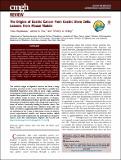| dc.contributor.author | Hayakawa, Yoku | |
| dc.contributor.author | Fox, James G | |
| dc.contributor.author | Wang, Tim | |
| dc.date.accessioned | 2018-09-05T13:52:18Z | |
| dc.date.available | 2018-09-05T13:52:18Z | |
| dc.date.issued | 2017-05 | |
| dc.identifier.issn | 2352345X | |
| dc.identifier.uri | http://hdl.handle.net/1721.1/117636 | |
| dc.description.abstract | The cellular origin of digestive cancers has been a long-standing question in the cancer field. Mouse models have identified long-lived stem cells in most organ systems, including the luminal gastrointestinal tract, and numerous studies have pointed to tissue resident stem cells as the main cellular origin of cancer. During gastric carcinogenesis, chronic inflammation induces genetic and epigenetic alterations in long-lived stem cells, along with expansion of stem cell niches, eventually leading to invasive cancer. The gastric corpus and antrum have distinct stem cells and stem cell niches, suggesting differential regulation of cancer initiation at the 2 sites. In this short review, we discuss recent experimental models and human studies, which provide important insights into the pathogenesis of gastric cancer. | en_US |
| dc.description.sponsorship | National Institutes of Health (U.S.) (grant U54CA126513) | en_US |
| dc.description.sponsorship | National Institutes of Health (U.S.) (grant R01CA093405) | en_US |
| dc.description.sponsorship | National Institutes of Health (U.S.) (grant R01CA120979) | en_US |
| dc.description.sponsorship | National Institutes of Health (U.S.) (grant R01DK052778) | en_US |
| dc.description.sponsorship | National Institutes of Health (U.S.) (grant R35CA210088) | en_US |
| dc.description.sponsorship | National Institutes of Health (U.S.) (grant T32OD010978) | en_US |
| dc.description.sponsorship | National Institutes of Health (U.S.) (grant P30ES002109) | en_US |
| dc.description.sponsorship | National Institutes of Health (U.S.) (grantd P01CA28842) | en_US |
| dc.description.sponsorship | Clyde Wu Family Foundation | en_US |
| dc.publisher | Elsevier BV | en_US |
| dc.relation.isversionof | http://dx.doi.org/10.1016/J.JCMGH.2017.01.013 | en_US |
| dc.rights | Creative Commons Attribution-NonCommercial-NoDerivs License | en_US |
| dc.rights.uri | http://creativecommons.org/licenses/by-nc-nd/4.0/ | en_US |
| dc.source | Elsevier | en_US |
| dc.title | The Origins of Gastric Cancer From Gastric Stem Cells: Lessons From Mouse Models | en_US |
| dc.type | Article | en_US |
| dc.identifier.citation | Hayakawa, Yoku, James G. Fox, and Timothy C. Wang. “The Origins of Gastric Cancer From Gastric Stem Cells: Lessons From Mouse Models.” Cellular and Molecular Gastroenterology and Hepatology 3, no. 3 (May 2017): 331–338. | en_US |
| dc.contributor.department | Massachusetts Institute of Technology. Department of Biological Engineering | en_US |
| dc.contributor.department | Massachusetts Institute of Technology. Department of Biology | en_US |
| dc.contributor.mitauthor | Fox, James G | |
| dc.contributor.mitauthor | Wang, Tim | |
| dc.relation.journal | Cellular and Molecular Gastroenterology and Hepatology | en_US |
| dc.eprint.version | Final published version | en_US |
| dc.type.uri | http://purl.org/eprint/type/JournalArticle | en_US |
| eprint.status | http://purl.org/eprint/status/PeerReviewed | en_US |
| dc.date.updated | 2018-08-29T18:11:09Z | |
| dspace.orderedauthors | Hayakawa, Yoku; Fox, James G.; Wang, Timothy C. | en_US |
| dspace.embargo.terms | N | en_US |
| dc.identifier.orcid | https://orcid.org/0000-0001-9307-6116 | |
| dc.identifier.orcid | https://orcid.org/0000-0002-4227-5163 | |
| mit.license | PUBLISHER_CC | en_US |
